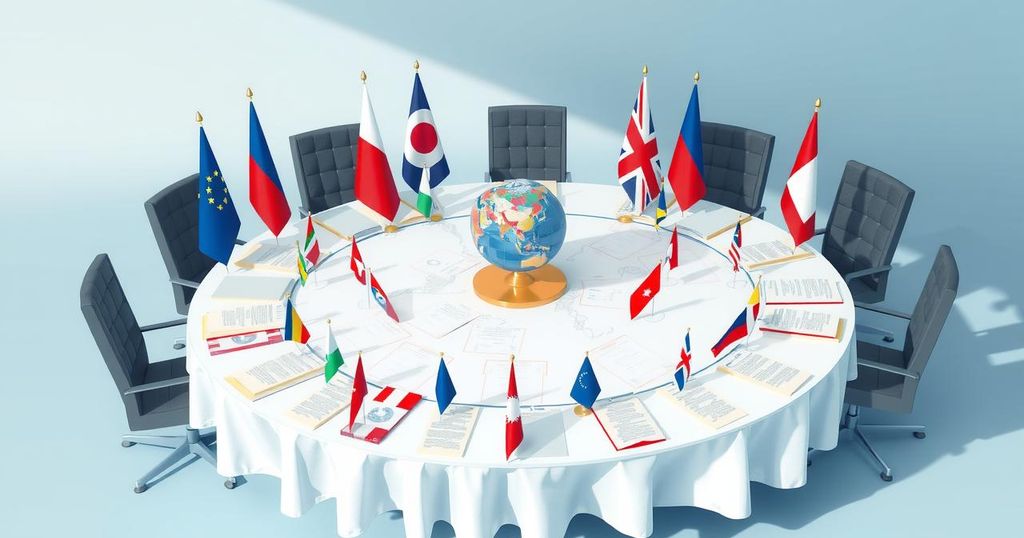Trump’s Renewed Focus on Iran: Implications for Nuclear Negotiations
The U.S. administration under President Trump is refocusing on Iran, seeking negotiations over its nuclear program amid regional shifts. Following Iranian losses against Israel, Trump has sent an invitation for talks, while Iran prepares for discussions with Russia and China. Despite Iran’s mixed signals, the situation remains tense with concerns over uranium enrichment and ongoing geopolitical maneuvering.
In response to significant changes within the Middle East, the U.S. administration, under President Donald Trump, has refocused attention toward Iran, initiating a new phase of the “maximum pressure” campaign. Trump has reached out to Iran’s leadership, prompting negotiations regarding Tehran’s nuclear capabilities, particularly after Iranian proxies incurred substantial losses against Israel. These developments coincide with increased U.S.-Russia collaboration aimed at mitigating tensions across various geopolitical arenas, including Ukraine and Syria.
Despite Iran’s mixed signals on negotiation willingness, the country is set to engage in nuclear discussions with Russia and China, highlighting its strategic considerations regarding the nuclear program and sanctions relief. Observers note that this diplomatic overture reflects perceived weaknesses within Iran following the Assad regime’s decline and Hezbollah’s setbacks in Lebanon. An Arab diplomat emphasized Trump’s tactical invitation to discuss not only nuclear issues but also regional missile capabilities.
The upcoming meeting, chaired by Chinese Vice Foreign Minister Ma Zhaoxu, is expected to include discussions on Iran’s nuclear activities and other pertinent subjects. Iranian officials, including Foreign Ministry spokesman Esmail Baghai, have characterized the talks as part of ongoing consultations. However, Iranian President Masoud Pezeshkian has firmly stated that negotiations cannot proceed amidst ongoing threats from the Trump administration.
In recent developments, Iranian Foreign Minister Abbas Araghchi criticized a closed-session UN Security Council meeting addressing Iran’s nuclear stockpile as a process that undermines state goodwill. He pointed out that members of the Council, including the U.S. and U.K., are increasingly alarmed by Iran’s enrichment of uranium, which has reportedly accelerated towards weapons-grade levels, as underscored by the International Atomic Energy Agency’s concerns.
While Iran has consistently denied intentions to develop nuclear weapons, reports indicate that the country is enriching uranium to near-90 percent purity. Last week, Iran’s supreme leader, Ayatollah Ali Khamenei, dismissed U.S. calls for discussion, referring to them as undue pressure. Following the upcoming discussions, a further round of expert-level talks is anticipated. Iran, alongside Russia and China, has also initiated annual naval exercises in the Gulf of Oman.
President Trump’s previous “maximum-pressure” policy initiated in 2018 has significantly impacted Iran’s economy, prompting a severe increase in its nuclear activities. A subsequent drone strike authorized by Trump in 2020 against Iranian General Qassem Suleimani escalated tensions, pushing the two nations to the brink of war following Iran’s retaliation against a U.S. base in Iraq.
The evolving dynamics surrounding U.S.-Iran relations manifest through the Trump administration’s renewed efforts to negotiate a nuclear agreement amidst a backdrop of Iranian vulnerabilities. Despite mixed signals from Tehran, ongoing discussions involving Russia and China underscore significant geopolitical interactions. As tensions remain high, the likelihood of a negotiated resolution continues to be critically assessed by both parties, highlighting the complexities of Middle Eastern diplomacy and security.
Original Source: www.thenationalnews.com




Post Comment